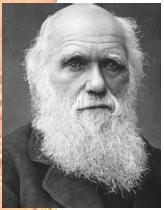Darwin, Charles
English naturalist 1809–1882
Charles Darwin was the founder of modern evolutionary thought, and the developer, along with Alfred Russel Wallace, of the theory that natural selection is a principle driving force in evolution. Darwin is generally recognized as the single greatest thinker in the history of biology, whose contributions provided the basis for understanding the immense diversity that characterizes the natural world.

Darwin was born February 12, 1809, into a wealthy English family. A lifelong interest in natural history led him to embark, at age twenty-two, on a five-year voyage to South America aboard the HMS Beagle as the ship's naturalist. Darwin collected a wealth of specimens and made observations of both living species and fossils he encountered. Darwin was particularly struck by similarities he observed between the species found on the Galapagos Islands off the western coast of South America, and species of the mainland. He also noted differences and similarities among species found on the numerous islands of the Galapagos. The evidence suggested each species had not been independently formed by the Creator, but rather had diverged from a smaller group of common ancestors.
Upon returning home, Darwin pondered these ideas in conjunction with two other streams of thought. The first was the theory of uniformatarianism of geologist Charles Lyell. Uniformatarianism held that major geologic features, such as mountains and canyons, were formed not by rapid and short-lived catastrophic events such as floods, but rather by the slow, steady action of forces such as erosion. This mechanism suggested that Earth was much older than previously believed, a fact which Darwin saw provided the requisite time for the steady accumulation of change that would turn one species into another. The second idea was from An Essay on the Principle of Population, in which economist Thomas Malthus contrasted the potential for exponential increase in human population with the much slower increase in food supply. Malthus suggested that competition, disease, war, and famine kept the human population in check. Darwin saw that this principle provided the selective force needed to bring about change in a species.
Natural Selection
Between 1837 and 1838, Darwin developed his ideas into the principle of natural selection, which combines struggle, heritable variation, and differential reproduction. He proposed that in all species, limited resources leads to a struggle for existence, either against other members of the species, or against the environment. Members of a species differ from one another, and some of those variations influence the success of an organism's struggle. Organisms with more useful variations will leave more offspring, who inherit those variations and so are better able to cope with the environment. As this process continues over time, with successive rounds of struggle, variation, and differential reproduction, the population will become increasingly well adapted to the environment. Organisms of one species who become separated into different environments, such as the birds of the Galapagos, could develop over time into separate species through the accumulation of differences best adapted for their separate environments.
For the next decade, Darwin collected evidence to support his theory, and discussed his ideas only with a small circle of colleagues. But in 1858, he learned that naturalist Alfred Russel Wallace had developed a similar theory. Urged on by friends, Darwin agreed in 1858 to jointly submit papers with Wallace to the Journal of the Linnaean Society, and this was how the world first learned of the principle of natural selection. A year later, Darwin published On the Origin of Species, or the Preservation of Favored Races in the Struggle for Life. It is no exaggeration to call this the most important book ever published in biology. In it, Darwin provided so convincing an argument for natural selection that it became widely accepted by scientists shortly after publication. With natural selection, Darwin had provided a mechanism for evolution and an explanation for the diversity of life.
Despite the power of the arguments Darwin provided, numerous problems remained with the theory, especially with the mechanism of inheritance. Critics argued that blending of traits (for instance, tall with short to give medium height) would ultimately dilute out any variations. It was not until the particulate nature of inheritance was discovered, from the work of Gregor Mendel, that this problem was resolved.
Darwin continued to explore the ramifications of natural selection in a series of books published over the next twenty years. In 1871, he published The Descent of Man, and Selection in Relation to Sex, in which he applied the theory of natural selection to argue that humans evolved from earlier apelike creatures, and suggested sexual selection as an important adjunct to natural selection.
On his death in 1882, in recognition of his scientific achievements, Darwin was buried in Westminster Abbey, along with Isaac Newton, Michael Faraday, and other great English scientists.
SEE ALSO Adaptation ; Buffon, Count (Georges-Louis Leclerc) ; Creationism ; Evolution, Evidence for ; Lamarck, Jean-Baptiste ; Mendel, Gregor ; Natural Selection ; Sexual Selection ; Species
Richard Robinson
Bibliography
Browne, Janet. Charles Darwin. Princeton, NJ: Princeton University Press, 1996.
Miller, Jonathan. Darwin for Beginners. New York: Pantheon Books, 1990.
HUXLEY, THOMAS HENRY (1825–1895)
English biologist and paleontologist famous for his enthusiastic public debates in support of English naturalist Charles Darwin's theory of evolution. Huxley never finished college, but went to work as an assistant surgeon aboard a British frigate. When he returned to England four years later, he had sent home so many specimens and scientific papers that he was immediately elected to the Royal Society. He never returned to college.
Comment about this article, ask questions, or add new information about this topic: